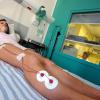In an eight-year study of more than 600 older adults, US researchers say they have further linked levels of cell-free DNA circulating in the blood to chronic inflammation and frailty.

The study is novel, said the investigators, because it focused on mitochondrial DNA rather than solely genomic DNA.
The new findings add to evidence that relatively high levels of DNA fragments found in routine blood samples could be accurate biomarkers for cognitive and physical decline.
Analysis also found correlations between such DNA fragments and the presence of other well-known biomarkers for ageing, including cytokine proteins, tumour necrosis factors (proteins made by the immune system in response to tumour growth) and proteins made by the liver when inflammation is present.
“By expanding the types of DNA screened for in the blood, the new research has expanded efforts to better understand and predict physical and cognitive declines,” said Peter Abadir, Associate Professor of Geriatric Medicine and Gerontology at the Johns Hopkins University School of Medicine.
Image credit | SPlibrary



